2018年春外研版英语八年级下册同步课件:Module 3 Journey to space (共61张PPT)
文档属性
| 名称 | 2018年春外研版英语八年级下册同步课件:Module 3 Journey to space (共61张PPT) | 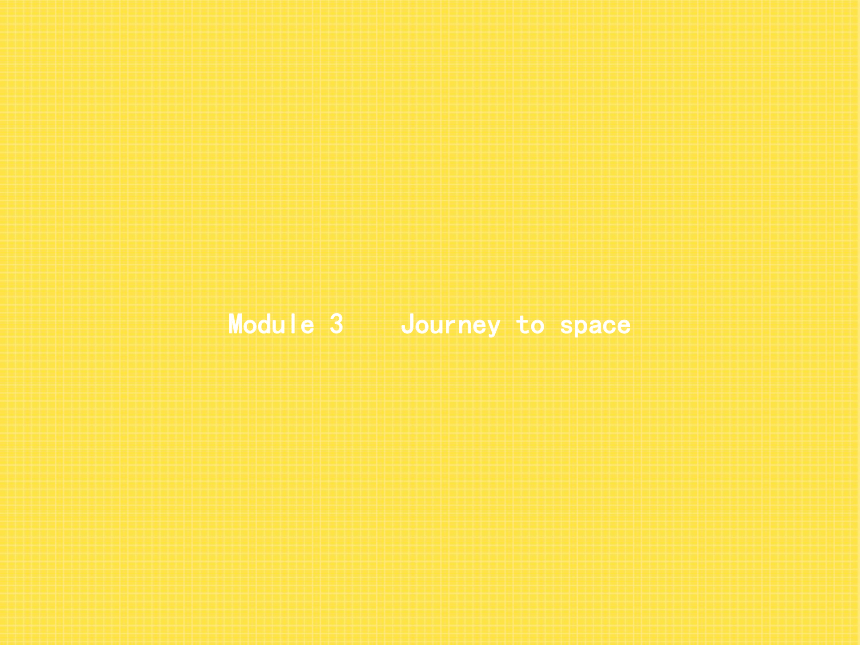 | |
| 格式 | zip | ||
| 文件大小 | 2.4MB | ||
| 资源类型 | 教案 | ||
| 版本资源 | 外研版 | ||
| 科目 | 英语 | ||
| 更新时间 | 2018-03-28 23:00:12 | ||
图片预览


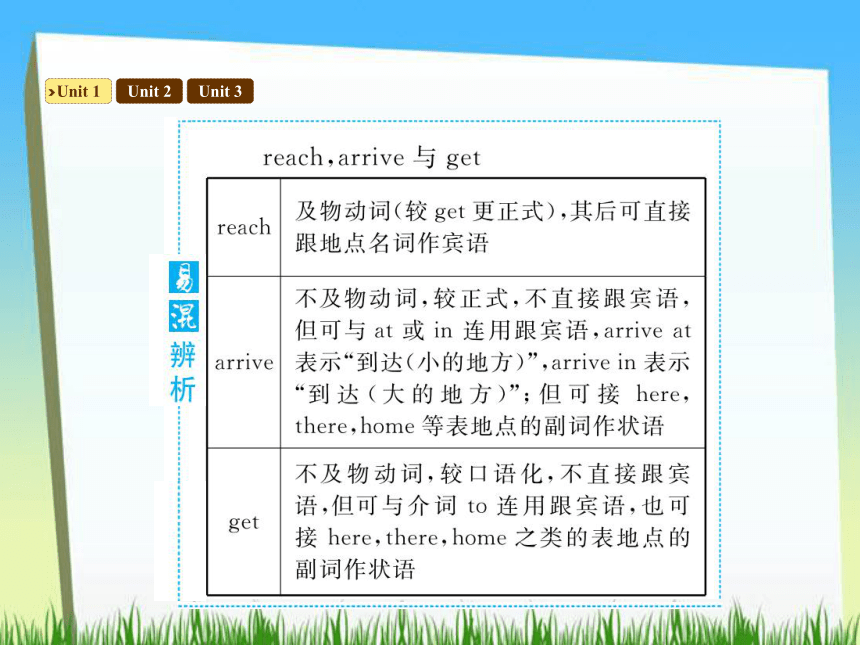
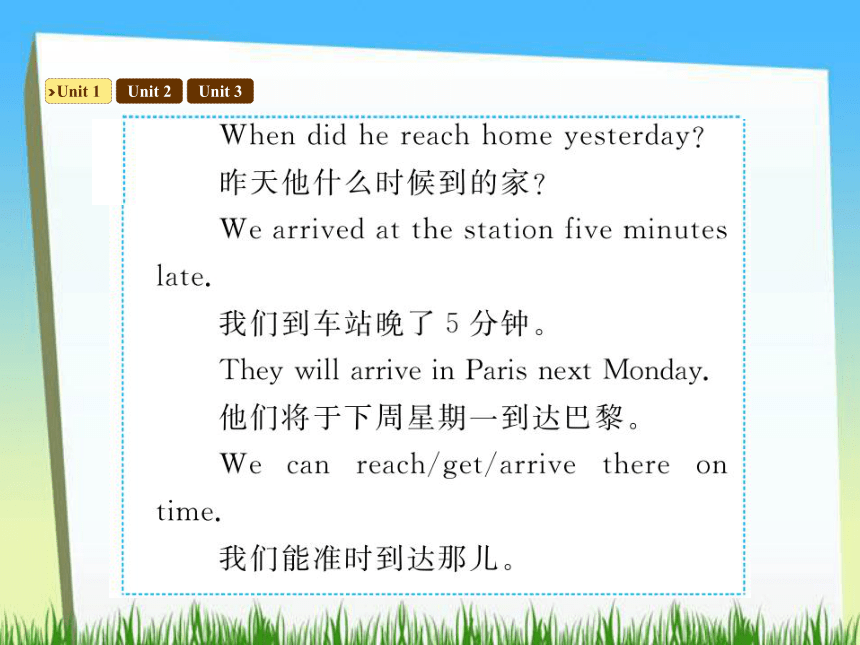




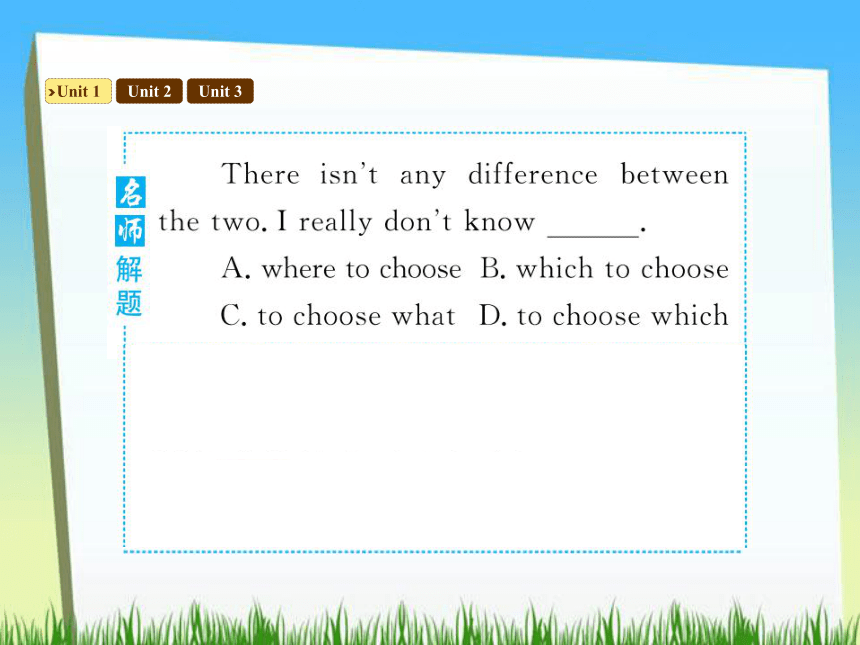
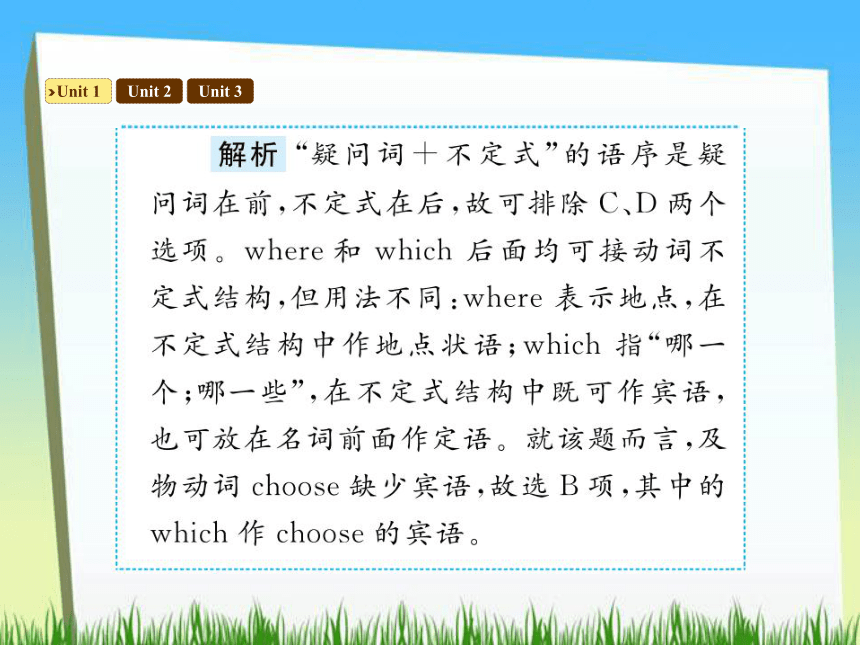


文档简介
课件61张PPT。Module 3 Journey to spaceUnit 1Unit 2Unit 31.reach(教材P18)到达;抵达
[解读] reach及物动词,意为“到达;抵达”。
He reached Beijing yesterday.
他昨天到达北京。Unit 1 Has it arrived yet? Unit 1Unit 2Unit 3Unit 1Unit 2Unit 3Unit 1Unit 2Unit 3拓展reach还可意为“够得着”。
She can’t reach the book on the shelf and neither can I.
她够不到书架上的书,我也够不到。Unit 1Unit 2Unit 32.What are you up to?(教材P18)你在忙什么?
[解读] be up to意为“正在做某事;忙于某事”。
What is he up to when everyone is busy doing their homework?
每个人都在忙着做作业的时候,他在做什么?
What are you on earth up to?
你究竟在搞什么名堂?
拓展(1)up to意为“多达”。
I can take up to four people in my car.
我的车能载4个人。
(2)be up to sb.意为“由……决定,由……负责”。
It’s up to you whether we accept the present or not.
我们要不要这份礼物由你决定。Unit 1Unit 2Unit 33.I haven’t started yet because I’m not sure how to make it.(教材P18)我还没有开始做,因为我不确定如何制作。
[解读1] yet副词,常用于句末。用于否定句时,意为“还,尚(用于表示某事在某一段时间尚未发生,但未来也许会发生)”;用于疑问句时,意为“已经”。
—Have you finished your homework yet?
——你已经完成家庭作业了吗?
—No,I haven’t finished it yet.
——不,没完成。
注意already一般用于肯定句中或句末。
I have already finished my homework.
我已经完成我的家庭作业了。Unit 1Unit 2Unit 3[解读2] 此处为“疑问词+动词不定式” 作be sure的宾语。疑问代词what,which,whom或疑问副词how,when,where等疑问词后加不定式构成不定式短语,在句中作宾语,通常放在tell,show,teach,learn等动词或短语动词的后面。
He will advise you what to do.
他会建议你们做什么。
Will you show me how to use this machine?
你能示范教我如何使用这部机器吗?Unit 1Unit 2Unit 3Unit 1Unit 2Unit 3Unit 1Unit 2Unit 34.Sure,no problem.(教材P18)当然,没问题。
[解读] no problem意为“没问题”,用来表示同意或愉快地回答请求。
—Could you post the letter for me?
——请帮我寄这封信好吗?
—No problem.——没问题。Unit 1Unit 2Unit 3拓展no problem在口语中的其他用法
(1)用来回答感谢(主要用于美国英语中),意为“不用谢; 别客气;没什么”。
—Thank you very much.——非常感谢你。
—No problem.——没什么。
(2)用来回答道歉(主要用于美国英语中),意为“没关系; 没什么”。
—Excuse me for smoking here.
——请原谅我在这儿抽烟了。
—No problem.——没关系。
(3)用来表示有能力做某事,意为“没问题;不在话下”。
—Can you make a kite?
——你会做风筝吗?
—No problem.——没问题。Unit 1Unit 2Unit 35.Have you heard the latest news?(教材P18)你听说最近的新闻了没?
[解读1] latest形容词,意为“最近的;最新的”。
Have you read Mo Yan’s latest work?
你读过莫言最新的作品吗?Unit 1Unit 2Unit 3拓展latest用作late的最高级,意为“最晚;最迟”。 Unit 1Unit 2Unit 3[解读2] news不可数名词,意为“新闻;消息”。
No news is good news.
没有消息就是好消息。
注意“一条新闻”可表达为a piece of news。Unit 1Unit 2Unit 36.The journey has taken several months.(教材P18)旅途花了几个月的时间。
[解读] take动词,在此处表示“花费”,常指花费“时间或金钱”,其常用句型为:It takes sb.some time to do sth.“某人花多少时间做某事”,注意后面动词前的to不可丢掉。
It takes him an hour to do his homework in the evening.
晚上他要花一小时做作业。Unit 1Unit 2Unit 3Unit 1Unit 2Unit 37.That’s why it’s on the news.(教材P18)这就是它(宇宙飞船)上新闻的原因。
[解读1] That’s why...意为“这就是……的原因”,含有why引导的表语从句。由引导词引导的作表语的句子叫表语从句。
That’s why I don’t like the person.
那就是我不喜欢这个人的原因。Unit 1Unit 2Unit 3Unit 1Unit 2Unit 3[解读2] on在这里是介词,意为“在(播放)中”。
I heard the news on the radio.
我在广播中听到的消息。Unit 1Unit 2Unit 38.So have they discovered life on Mars?(教材P18)那么宇航员在火星上发现了生命了吗?
[解读] discover动词,意为“发现;找到”。指发现原来已有但不为人知的事物。
They discovered a new oil field.
他们发现了一个新油田。Unit 1Unit 2Unit 3Unit 1Unit 2Unit 3Unit 1Unit 2Unit 39.Yes,but no one has been to Mars yet,because Mars is very far away,much farther than the moon.(教材P18)是的,但是还没有人去过火星,因为火星非常遥远,比月球远得多。
[解读1] far away 意为“遥远;远”。far away from意为“离……远”。
The bus stop is far away.
公共汽车站很远。
We’ll have lunch at a restaurant not far away from the office.
我们会去一家离办公室不远的餐馆吃午饭。
[解读2] much(程度副词)用在比较级前,以加强语气。
That actress is already 50,but she looks much younger.
那个女演员已经50岁了,但她看上去年轻得多。Unit 1Unit 2Unit 310.Lots of scientists are working hard in order to send astronauts to Mars one day.(教材P18)为了有一天把宇航员送到火星上去,许多科学家正在努力。
[解读] in order to意为“为了”。其后跟动词原形,引导目的状语,置于句首或句中。
We should work hard in order to pass the exam.
为了能通过考试,我们应该努力学习。
In order to earn enough money,he worked late into the night.
为了赚到足够的钱,他工作到深夜。Unit 1Unit 2Unit 3注意in order that和so that引导目的状语时,后接从句。
We should work hard in order that /so that we can pass the exam.
为了能通过考试,我们应该努力学习。
拓展in order to引导目的状语,可以直接用动词不定式即to do sth.来代替。Unit 1Unit 2Unit 3Unit 2 We have not found life on any other planets yet.1.Scientists think that there has been life on the earth for hundreds of millions of years.(教材P20)科学家们认为地球上的生命已有数亿年的历史。
[解读1] there has been是there be句型的现在完成时态。there be句型的时态是通过变化be动词来实现。
There will be rain in all parts of the country next week.
下周全国各地将有雨。
There’s going to be a meeting tomorrow.
明天将要有一个会议。
There is some milk in the bottle.
瓶子里有一些牛奶。Unit 1Unit 2Unit 3[解读2] Unit 1Unit 2Unit 3口诀助记百、千、百万和十亿,准确数,用原形;表大概,加s和of。
注意当这些词前有数词或several,some等修饰时则不加s,也不跟介词of,直接跟名词。Unit 1Unit 2Unit 3Unit 1Unit 2Unit 3Unit 1Unit 2Unit 32.None of them has an environment like that of the earth,so scientists do not think they will find life on them.(教材P20)它们中没有一个有类似地球的环境存在,所以科学家们并不认为在它们上面会发现生命。
[解读] none不定代词,意为“没有一人;没有一个;一点儿也没有”。既可指人,也可指物。
None of my friends is /are interested.
我的朋友没有一个感兴趣。
None of the keys can open the door.
没有一把钥匙能打开这个门。Unit 1Unit 2Unit 3Unit 1Unit 2Unit 3Unit 1Unit 2Unit 3Unit 1Unit 2Unit 3Unit 1Unit 2Unit 33.However,no spaceship has travelled far enough to reach other stars in our Galaxy.(教材P20)然而,没有一艘宇宙飞船飞得足够远以到达我们银河系中的其他恒星。
[解读] adj./adv.+enough to do sth.意为“足够……做某事”,其中enough是副词,修饰形容词或副词要后置,其后跟动词不定式。
The boy is old enough to go to school.
这个男孩到了上学的年龄了。
He ran fast enough to catch the thief.
他跑得足够快,抓住了那个小偷。Unit 1Unit 2Unit 3Unit 1Unit 2Unit 3Unit 1Unit 2Unit 34.Scientists have always asked the questions:with so many stars in the universe,are we alone,or is there life out there in space?(教材P20)科学家们一直在问这些问题:宇宙中有这么多恒星,我们是孤单的吗,还是在远方的太空中还有生命存在呢?
[解读1] with so many stars in the universe是with的复合结构,在句中作伴随状语。“with+宾语+宾语补足语”结构中,宾语补足语可由动词-ing、过去分词、形容词、副词、动词不定式或介词短语充当。
She stood there chatting with her friend,with her child playing beside her.她站在那儿跟朋友闲聊,孩子在旁边玩。(动词-ing作宾语补足语)
I think we can leave with our heads held high.我认为我们可以高昂着头离开。(过去分词作宾语补足语)Unit 1Unit 2Unit 3He stood at the door,with a computer in his hand.他站在门口,手里拿着一部电脑。(介词短语作宾语补足语)
He likes to sleep with the windows open.他喜欢开着窗户睡觉。(形容词作宾语补足语)
The boy was walking,with his father ahead.父亲在前,小孩在后走着。(副词作宾语补足语)
With so much work to do,I have no time to take a holiday.有这么多工作要做,我没有时间休假。(动词不定式作宾语补足语)
He sat there thinking,with his head in his hands.他双手抱着头,坐在那儿沉思。(介词短语作宾语补足语)
[解读2] alone为形容词,意为“单独的;独自的”。
I looked around.I was alone in the forest.
我向四周看了看,森林里只有我自己。Unit 1Unit 2Unit 3Unit 1Unit 2Unit 3图片助记lonely和alone Unit 1Unit 2Unit 3Unit 1Unit 2Unit 3Unit 1Unit 2Unit 35.Why has no one communicated with us?(教材P20)为什么没有人和我们联系过呢?
[解读] communicate动词,意为“联系;交流”。其名词形式为communication。communicate with sb.意为“和某人交谈”。
We usually communicate by phone.
我们通常电话联系。
It’s very easy to communicate with others with the development of science.
随着科技的发展,和别人交流很容易。
拓展have a communication with sb.意为“和某人交流;和某人谈话”。
I don’t know how to learn English.I’d like to have a conversation with my English teacher.
我不知道如何学习英语,我想和英语老师谈谈。Unit 1Unit 2Unit 3Unit 1Unit 2Unit 3Unit 3 Language in use 1.Astronauts have been to the moon and returned.(教材P22)宇航员们去过月球并返回了。
[解读] return动词,在这里意为“返回,回来”,相当于come/go back。
Blair will return to London tonight.
今晚布莱尔将返回伦敦。
拓展return还可以作动词,意为“归还”。
He has not returned me the book yet.
他还没把书还给我。Unit 1Unit 2Unit 32.I’ve just finished reading a great book at school.(教材P23)我刚刚在学校读完一本很棒的书。
[解读] finish doing sth.意为“做完某事”。
Have you finished reading the novel yet?
你已经读完这本小说了吗?
拓展其后跟动词-ing作宾语的动词(短语)还有keep,enjoy,mind,practise,look forward to等。
口诀助记介意喜欢保持练习,期待后跟动名词。Unit 1Unit 2Unit 3Unit 1Unit 2Unit 33.I haven’t (2) anything as good as that for a long time!(教材P23)我已经很久没有(2) 像它一样好的书了!?
[解读] as...as意为“和……一样”,表示两者之间的同级比较,两个as之间用形容词或副词的原级形式。
Mike is as careful as Mary.
迈克和玛丽一样认真。
拓展not as/so...as意为“不如……”,表示前者不如后者。
Jack doesn’t dance so well as Lucy.
杰克跳舞不如露西跳得好。Unit 1Unit 2Unit 3Unit 1Unit 2Unit 3Unit 1Unit 2Unit 34....Saturday is named after the planet Saturn...(教材P25)……星期六是以土星命名的……
[解读] be named after意为“以……命名”,其中name是动词,意为“命名;名字叫”。
Mars,the “Red Planet”,is named after the Roman god of war.
火星,那个红色的行星,是以罗马战神的名字命名的。12现在完成时(2)
1.现在完成时表示动作已经完成并对现在产生的影响和结果,从时间上看与现在仍然有密不可分的联系,通常用时间副词just,already,yet等作时间状语。12122.have(has) been to,have(has) been in与have(has) gone to的区别:12Have you ever been to Beijing?
你去过北京吗?
Mary has never been to the Great Wall.
玛丽从来没去过长城。
Mr.Brown has been in Shanghai for three days.
布朗先生在上海待了三天了。
How long have they been in China?
他们在中国待了多长时间了?
—Where is Tom?汤姆在哪里?
—He’s not here.He has gone to the bookshop.
他不在这里,他去书店了。
—Look! Here comes Mr.Brown.看,布朗先生来了。
—It can’t be him.He has gone to England.
不可能是他,他去英国了。Unit 1 Has it arrived yet? 1.earth-1;land-2;message-5;moon-7;news-3;planet-8;reach-4;scientist-6
2.1.Mars 2.eight 3.messages 4.life
3.1.They have got a project on spaceships.
2.He isn’t sure how to make the model.
3.The spaceship to Mars has reached there.
4.No one has been to Mars yet,because Mars is very far away,much farther than the moon.
4.1.sent 2.arrived 3.planet 4.discovered 5.yet Unit 2 We have not found life on any other planets yet. 2.Anyone out there?
3.2.√ 3.√ 4.√
4.1.solar system 2.none 3.environment 4.communicate 5.universeUnit 3 Language in use 1.1.already 2.just 3.already 4.yet
2.1.been 2.gone 3.gone 4.been
3.1.has gone 2.have been 3.have been
4.have gone
4.1.watched 2.discovered 3.are;trying
4.haven’t found 5.Have;seen
6.1.just 2.read 3.been 4.never 5.met 6.written 7.yet
7.1.six 2.two 3.excited 4.twice 5.beautiful 6.interested
9.1.astronaut 2.moon 3.news 4.reach 5.discovered 6.spaceships 7.yet
[解读] reach及物动词,意为“到达;抵达”。
He reached Beijing yesterday.
他昨天到达北京。Unit 1 Has it arrived yet? Unit 1Unit 2Unit 3Unit 1Unit 2Unit 3Unit 1Unit 2Unit 3拓展reach还可意为“够得着”。
She can’t reach the book on the shelf and neither can I.
她够不到书架上的书,我也够不到。Unit 1Unit 2Unit 32.What are you up to?(教材P18)你在忙什么?
[解读] be up to意为“正在做某事;忙于某事”。
What is he up to when everyone is busy doing their homework?
每个人都在忙着做作业的时候,他在做什么?
What are you on earth up to?
你究竟在搞什么名堂?
拓展(1)up to意为“多达”。
I can take up to four people in my car.
我的车能载4个人。
(2)be up to sb.意为“由……决定,由……负责”。
It’s up to you whether we accept the present or not.
我们要不要这份礼物由你决定。Unit 1Unit 2Unit 33.I haven’t started yet because I’m not sure how to make it.(教材P18)我还没有开始做,因为我不确定如何制作。
[解读1] yet副词,常用于句末。用于否定句时,意为“还,尚(用于表示某事在某一段时间尚未发生,但未来也许会发生)”;用于疑问句时,意为“已经”。
—Have you finished your homework yet?
——你已经完成家庭作业了吗?
—No,I haven’t finished it yet.
——不,没完成。
注意already一般用于肯定句中或句末。
I have already finished my homework.
我已经完成我的家庭作业了。Unit 1Unit 2Unit 3[解读2] 此处为“疑问词+动词不定式” 作be sure的宾语。疑问代词what,which,whom或疑问副词how,when,where等疑问词后加不定式构成不定式短语,在句中作宾语,通常放在tell,show,teach,learn等动词或短语动词的后面。
He will advise you what to do.
他会建议你们做什么。
Will you show me how to use this machine?
你能示范教我如何使用这部机器吗?Unit 1Unit 2Unit 3Unit 1Unit 2Unit 3Unit 1Unit 2Unit 34.Sure,no problem.(教材P18)当然,没问题。
[解读] no problem意为“没问题”,用来表示同意或愉快地回答请求。
—Could you post the letter for me?
——请帮我寄这封信好吗?
—No problem.——没问题。Unit 1Unit 2Unit 3拓展no problem在口语中的其他用法
(1)用来回答感谢(主要用于美国英语中),意为“不用谢; 别客气;没什么”。
—Thank you very much.——非常感谢你。
—No problem.——没什么。
(2)用来回答道歉(主要用于美国英语中),意为“没关系; 没什么”。
—Excuse me for smoking here.
——请原谅我在这儿抽烟了。
—No problem.——没关系。
(3)用来表示有能力做某事,意为“没问题;不在话下”。
—Can you make a kite?
——你会做风筝吗?
—No problem.——没问题。Unit 1Unit 2Unit 35.Have you heard the latest news?(教材P18)你听说最近的新闻了没?
[解读1] latest形容词,意为“最近的;最新的”。
Have you read Mo Yan’s latest work?
你读过莫言最新的作品吗?Unit 1Unit 2Unit 3拓展latest用作late的最高级,意为“最晚;最迟”。 Unit 1Unit 2Unit 3[解读2] news不可数名词,意为“新闻;消息”。
No news is good news.
没有消息就是好消息。
注意“一条新闻”可表达为a piece of news。Unit 1Unit 2Unit 36.The journey has taken several months.(教材P18)旅途花了几个月的时间。
[解读] take动词,在此处表示“花费”,常指花费“时间或金钱”,其常用句型为:It takes sb.some time to do sth.“某人花多少时间做某事”,注意后面动词前的to不可丢掉。
It takes him an hour to do his homework in the evening.
晚上他要花一小时做作业。Unit 1Unit 2Unit 3Unit 1Unit 2Unit 37.That’s why it’s on the news.(教材P18)这就是它(宇宙飞船)上新闻的原因。
[解读1] That’s why...意为“这就是……的原因”,含有why引导的表语从句。由引导词引导的作表语的句子叫表语从句。
That’s why I don’t like the person.
那就是我不喜欢这个人的原因。Unit 1Unit 2Unit 3Unit 1Unit 2Unit 3[解读2] on在这里是介词,意为“在(播放)中”。
I heard the news on the radio.
我在广播中听到的消息。Unit 1Unit 2Unit 38.So have they discovered life on Mars?(教材P18)那么宇航员在火星上发现了生命了吗?
[解读] discover动词,意为“发现;找到”。指发现原来已有但不为人知的事物。
They discovered a new oil field.
他们发现了一个新油田。Unit 1Unit 2Unit 3Unit 1Unit 2Unit 3Unit 1Unit 2Unit 39.Yes,but no one has been to Mars yet,because Mars is very far away,much farther than the moon.(教材P18)是的,但是还没有人去过火星,因为火星非常遥远,比月球远得多。
[解读1] far away 意为“遥远;远”。far away from意为“离……远”。
The bus stop is far away.
公共汽车站很远。
We’ll have lunch at a restaurant not far away from the office.
我们会去一家离办公室不远的餐馆吃午饭。
[解读2] much(程度副词)用在比较级前,以加强语气。
That actress is already 50,but she looks much younger.
那个女演员已经50岁了,但她看上去年轻得多。Unit 1Unit 2Unit 310.Lots of scientists are working hard in order to send astronauts to Mars one day.(教材P18)为了有一天把宇航员送到火星上去,许多科学家正在努力。
[解读] in order to意为“为了”。其后跟动词原形,引导目的状语,置于句首或句中。
We should work hard in order to pass the exam.
为了能通过考试,我们应该努力学习。
In order to earn enough money,he worked late into the night.
为了赚到足够的钱,他工作到深夜。Unit 1Unit 2Unit 3注意in order that和so that引导目的状语时,后接从句。
We should work hard in order that /so that we can pass the exam.
为了能通过考试,我们应该努力学习。
拓展in order to引导目的状语,可以直接用动词不定式即to do sth.来代替。Unit 1Unit 2Unit 3Unit 2 We have not found life on any other planets yet.1.Scientists think that there has been life on the earth for hundreds of millions of years.(教材P20)科学家们认为地球上的生命已有数亿年的历史。
[解读1] there has been是there be句型的现在完成时态。there be句型的时态是通过变化be动词来实现。
There will be rain in all parts of the country next week.
下周全国各地将有雨。
There’s going to be a meeting tomorrow.
明天将要有一个会议。
There is some milk in the bottle.
瓶子里有一些牛奶。Unit 1Unit 2Unit 3[解读2] Unit 1Unit 2Unit 3口诀助记百、千、百万和十亿,准确数,用原形;表大概,加s和of。
注意当这些词前有数词或several,some等修饰时则不加s,也不跟介词of,直接跟名词。Unit 1Unit 2Unit 3Unit 1Unit 2Unit 3Unit 1Unit 2Unit 32.None of them has an environment like that of the earth,so scientists do not think they will find life on them.(教材P20)它们中没有一个有类似地球的环境存在,所以科学家们并不认为在它们上面会发现生命。
[解读] none不定代词,意为“没有一人;没有一个;一点儿也没有”。既可指人,也可指物。
None of my friends is /are interested.
我的朋友没有一个感兴趣。
None of the keys can open the door.
没有一把钥匙能打开这个门。Unit 1Unit 2Unit 3Unit 1Unit 2Unit 3Unit 1Unit 2Unit 3Unit 1Unit 2Unit 3Unit 1Unit 2Unit 33.However,no spaceship has travelled far enough to reach other stars in our Galaxy.(教材P20)然而,没有一艘宇宙飞船飞得足够远以到达我们银河系中的其他恒星。
[解读] adj./adv.+enough to do sth.意为“足够……做某事”,其中enough是副词,修饰形容词或副词要后置,其后跟动词不定式。
The boy is old enough to go to school.
这个男孩到了上学的年龄了。
He ran fast enough to catch the thief.
他跑得足够快,抓住了那个小偷。Unit 1Unit 2Unit 3Unit 1Unit 2Unit 3Unit 1Unit 2Unit 34.Scientists have always asked the questions:with so many stars in the universe,are we alone,or is there life out there in space?(教材P20)科学家们一直在问这些问题:宇宙中有这么多恒星,我们是孤单的吗,还是在远方的太空中还有生命存在呢?
[解读1] with so many stars in the universe是with的复合结构,在句中作伴随状语。“with+宾语+宾语补足语”结构中,宾语补足语可由动词-ing、过去分词、形容词、副词、动词不定式或介词短语充当。
She stood there chatting with her friend,with her child playing beside her.她站在那儿跟朋友闲聊,孩子在旁边玩。(动词-ing作宾语补足语)
I think we can leave with our heads held high.我认为我们可以高昂着头离开。(过去分词作宾语补足语)Unit 1Unit 2Unit 3He stood at the door,with a computer in his hand.他站在门口,手里拿着一部电脑。(介词短语作宾语补足语)
He likes to sleep with the windows open.他喜欢开着窗户睡觉。(形容词作宾语补足语)
The boy was walking,with his father ahead.父亲在前,小孩在后走着。(副词作宾语补足语)
With so much work to do,I have no time to take a holiday.有这么多工作要做,我没有时间休假。(动词不定式作宾语补足语)
He sat there thinking,with his head in his hands.他双手抱着头,坐在那儿沉思。(介词短语作宾语补足语)
[解读2] alone为形容词,意为“单独的;独自的”。
I looked around.I was alone in the forest.
我向四周看了看,森林里只有我自己。Unit 1Unit 2Unit 3Unit 1Unit 2Unit 3图片助记lonely和alone Unit 1Unit 2Unit 3Unit 1Unit 2Unit 3Unit 1Unit 2Unit 35.Why has no one communicated with us?(教材P20)为什么没有人和我们联系过呢?
[解读] communicate动词,意为“联系;交流”。其名词形式为communication。communicate with sb.意为“和某人交谈”。
We usually communicate by phone.
我们通常电话联系。
It’s very easy to communicate with others with the development of science.
随着科技的发展,和别人交流很容易。
拓展have a communication with sb.意为“和某人交流;和某人谈话”。
I don’t know how to learn English.I’d like to have a conversation with my English teacher.
我不知道如何学习英语,我想和英语老师谈谈。Unit 1Unit 2Unit 3Unit 1Unit 2Unit 3Unit 3 Language in use 1.Astronauts have been to the moon and returned.(教材P22)宇航员们去过月球并返回了。
[解读] return动词,在这里意为“返回,回来”,相当于come/go back。
Blair will return to London tonight.
今晚布莱尔将返回伦敦。
拓展return还可以作动词,意为“归还”。
He has not returned me the book yet.
他还没把书还给我。Unit 1Unit 2Unit 32.I’ve just finished reading a great book at school.(教材P23)我刚刚在学校读完一本很棒的书。
[解读] finish doing sth.意为“做完某事”。
Have you finished reading the novel yet?
你已经读完这本小说了吗?
拓展其后跟动词-ing作宾语的动词(短语)还有keep,enjoy,mind,practise,look forward to等。
口诀助记介意喜欢保持练习,期待后跟动名词。Unit 1Unit 2Unit 3Unit 1Unit 2Unit 33.I haven’t (2) anything as good as that for a long time!(教材P23)我已经很久没有(2) 像它一样好的书了!?
[解读] as...as意为“和……一样”,表示两者之间的同级比较,两个as之间用形容词或副词的原级形式。
Mike is as careful as Mary.
迈克和玛丽一样认真。
拓展not as/so...as意为“不如……”,表示前者不如后者。
Jack doesn’t dance so well as Lucy.
杰克跳舞不如露西跳得好。Unit 1Unit 2Unit 3Unit 1Unit 2Unit 3Unit 1Unit 2Unit 34....Saturday is named after the planet Saturn...(教材P25)……星期六是以土星命名的……
[解读] be named after意为“以……命名”,其中name是动词,意为“命名;名字叫”。
Mars,the “Red Planet”,is named after the Roman god of war.
火星,那个红色的行星,是以罗马战神的名字命名的。12现在完成时(2)
1.现在完成时表示动作已经完成并对现在产生的影响和结果,从时间上看与现在仍然有密不可分的联系,通常用时间副词just,already,yet等作时间状语。12122.have(has) been to,have(has) been in与have(has) gone to的区别:12Have you ever been to Beijing?
你去过北京吗?
Mary has never been to the Great Wall.
玛丽从来没去过长城。
Mr.Brown has been in Shanghai for three days.
布朗先生在上海待了三天了。
How long have they been in China?
他们在中国待了多长时间了?
—Where is Tom?汤姆在哪里?
—He’s not here.He has gone to the bookshop.
他不在这里,他去书店了。
—Look! Here comes Mr.Brown.看,布朗先生来了。
—It can’t be him.He has gone to England.
不可能是他,他去英国了。Unit 1 Has it arrived yet? 1.earth-1;land-2;message-5;moon-7;news-3;planet-8;reach-4;scientist-6
2.1.Mars 2.eight 3.messages 4.life
3.1.They have got a project on spaceships.
2.He isn’t sure how to make the model.
3.The spaceship to Mars has reached there.
4.No one has been to Mars yet,because Mars is very far away,much farther than the moon.
4.1.sent 2.arrived 3.planet 4.discovered 5.yet Unit 2 We have not found life on any other planets yet. 2.Anyone out there?
3.2.√ 3.√ 4.√
4.1.solar system 2.none 3.environment 4.communicate 5.universeUnit 3 Language in use 1.1.already 2.just 3.already 4.yet
2.1.been 2.gone 3.gone 4.been
3.1.has gone 2.have been 3.have been
4.have gone
4.1.watched 2.discovered 3.are;trying
4.haven’t found 5.Have;seen
6.1.just 2.read 3.been 4.never 5.met 6.written 7.yet
7.1.six 2.two 3.excited 4.twice 5.beautiful 6.interested
9.1.astronaut 2.moon 3.news 4.reach 5.discovered 6.spaceships 7.yet
同课章节目录
- Module 1 Feelings and impressions
- Unit 1 It smells delicious.
- Unit 2 I feel nervous when I speak Chinese .
- Unit 3 Language in use
- Module 2 Experiences
- Unit 1 I've also entered lots of speaking competi
- Unit 2 They have seen the Pyramids.
- Unit 3 Language in use
- Module 3 Journey to space
- Unit 1 Has it arrived yet?
- Unit 2 We have not found life on any other planet
- Unit 3 Language in use
- Module 4 Seeing the docto
- Unit 1 I haven't done much exercise since I got m
- Unit 2 We have played football for a year now
- Unit 3 Language in use
- Module 5 Cartoons
- Unit 1 It's time to watch a cartoon.
- Unit 2 Tintin has been popular for over eighty yea
- Unit 3 Language in use
- Revision module A
- Module 6 Hobbies
- Unit 1 Do you collect anything ?
- Unit 2 Hobbies can make you grow as a person.
- Unit 3 Language in use
- Module 7 Summer in Los Angeles
- Unit 1 Please write to me and send me some photos
- Unit 2 Fill out a form and come to learn English
- Unit 3 Language in use
- Module 8 Time off
- Unit 1 I can hardly believe we are in the city ce
- Unit 2 We thought somebody was moving about
- Unit 3 Language in use
- Module 9 Friendship
- Unit 1 Could I ask if you've mentioned this to he
- Unit 2 I believe that the world is what you think
- Unit 3 Language in use
- Module 10 On the radio
- Unit 1 I hope that you can join us one day
- Unit 2 It seemed that they were speaking to me in
- Unit 3 Language in use
- Revision module B
